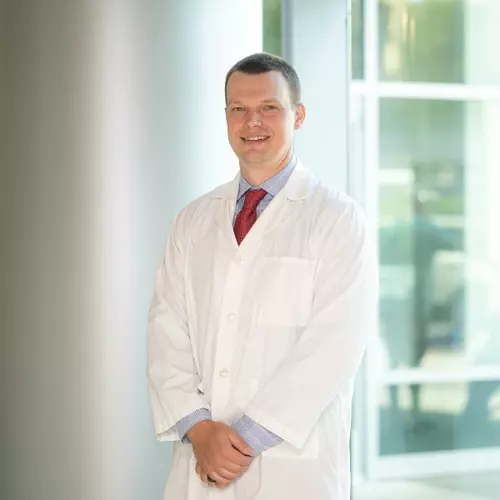
General Surgery Residency
From day one of our 5-year residency, you will work alongside attending surgeons – performing routine and rare surgical cases and building an unparalleled foundation for your general surgery practice.
Overview
Our General Surgery Residency program has a long tradition of developing qualified, competent and compassionate general surgeons who contribute their best to patients and communities. Our extensive broad training in general surgery will prepare you to enter practice in urban, rural or global settings – or continue your training in a surgical sub-specialty fellowship. Your hands-on experience includes more than 1,100 operative procedures in general surgery and surgical specialties at our flagship hospital, a tertiary referral and Level II Trauma Center, an advanced robotic curriculum and a state-of-the-art simulation lab on campus.
Clinical experience
We focus on your transition from physician to complete general surgeon with experience in vascular, pediatric care, minimally invasive surgery, foregut, hernia, colorectal, hepatobiliary, pancreatic, gastrointestinal, trauma/critical care, breast and endocrine surgery. You will complete rotations across the spectrum of general surgery including Anesthesia, Otolaryngology, Urology, Cardiothoracic Surgery, Interventional Radiology, Critical Care and Obstetrics & Gynecology. You will also participate in 2 rotations at the University of Wisconsin Hospital in Madison (Burn and Transplant). During your final year, our dedicated chief surgery resident service provides you with the unique opportunity for mentored autonomy, with your own clinic, operating room block time, endoscopy schedule and call responsibilities.

Academic focus
We believe a nurturing teaching atmosphere builds skilled surgeons and boosts patient care. You will participate in lectures, small group discussions and interactive conferences. Gundersen’s Integrated Center for Education, a simulation lab that has enhanced our reputation as a national leader in healthcare, provides space for your education, including new laparoscopic towers, a mock operating room, mannequin simulators and cadaver labs.
Research and innovation
We are committed to the advancement of the discipline, and clinical research is an important component of our residency program. You will have opportunities to improve the quality of surgical care through innovative scientific research and discovery - and present your work to others.

Benefits
We offer paid medical premiums, funds for educational experiences and more benefits to support you during your residency.
Resident life at Gundersen
We are focused on your professional development – and your personal growth and wellness. We support our residents through the physically, emotionally and intellectually challenging residency period so you retain your compassion for patients, passion for surgery and live your best life. Some of the ways we encourage work-life balance and resident well-being is by:
- Offering affordable resident housing just steps from our flagship medical center in La Crosse
- Building in longitudinal time for personal wellness and engaging resident team-building activities
- Providing schedules with limited night medicine and home call
- Supporting volunteerism and outreach to help you – and our communities – thrive

Our renowned system
Rooted in La Crosse, Wis., with our primary medical campus, our integrated medical system spans 3 states and includes more than 65 clinics and 6 critical access hospitals. Our 500+ providers deliver world-class medical care combined with the right amount of love...we call it love + medicine. La Crosse is home to more than 50,000 residents and offers the perks of small-town living with the arts, culture and entertainment of larger cities – all while boasting some of the most scenic landscapes in the country.

Why Gundersen

Call La Crosse Home
We have it all in La Crosse, Wis. Our vibrant city and region support your dream lifestyle with a welcoming community, culture and outdoor adventure.

Housing
Steps from our flagship medical center in La Crosse, our housing options allow you to enjoy the company of your family and the comradery of your colleagues.

Prioritizing Your Wellness
As you learn how to become the clinician you aspire to be, we’ll provide space to prioritize your mind and body wellness, and reach the work-life balance you need.